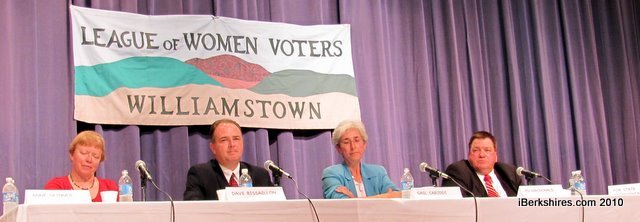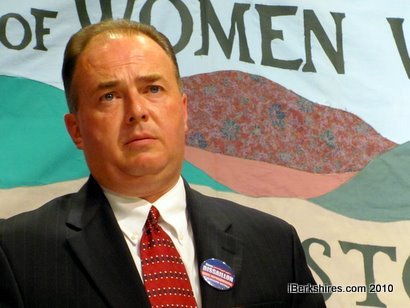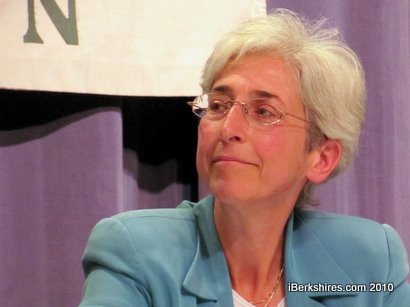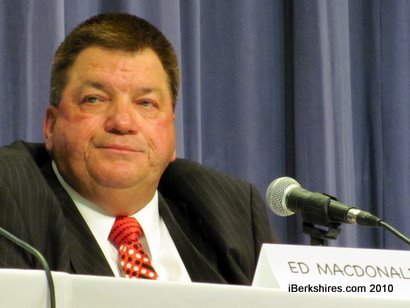| Home | About | Archives | RSS Feed |

MacDonald Calls for Small-Business Credits
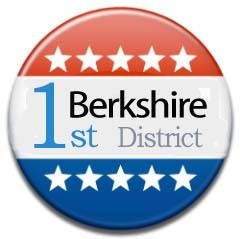 ADAMS, Mass. — Ed MacDonald, candidate for state representative, has released the following information regarding small businesses in the commonwealth.
ADAMS, Mass. — Ed MacDonald, candidate for state representative, has released the following information regarding small businesses in the commonwealth.
The 600,000 Massachusetts small businesses are vital to the financial well-being of the state's economy. Their contribution is essential for economic growth since they make up almost all employer firms in the state. As entrepreneurs and innovators, small-business owners represent a diverse group that continues to keep the state's economy productive. In these difficult times as much as we need to cut spending, we also need to invest in creating jobs.
The commonwealth has invested hundreds of millions, perhaps billions, of capital dollars into technology development initiatives over the past decade. Our state continues to be a leader in innovation and technology, outpacing competitor states in research and development, new patents, and federal innovation grants, according to Massachusetts Technology Collaborative. We need to build upon this success.
The bottom line is creating jobs. Massachusetts should establish a wage credit for each new job that is created. This credit should be for jobs created in the commonwealth and that stay here.
I propose the establishment of a wage credit for new jobs created by small companies of fewer than 100 employees in Massachusetts. This credit should be for up to 20 percent of the wages paid to any new hire or up to a maximum of $15,000. If the job is created in a high technology company in a field of projected growth such as biotechnology or nanotechnology, this credit should be increased to $25,000. Change the tax code for Massachusetts to be equal to the federal statute that allows businesses to claim losses for more than one year. This will help small businesses retain lost revenue and make them equal with federal regulations.
The credit should also increased to the higher level if the employer hires a dislocated worker, a lower income individual or a veteran. I recognize that small startup companies often do not have any real income in their formative years when they most need to hire new staff, so this tax credit should be refundable. To protect our taxpayers, these jobs must be retained for two years in the commonwealth, if not the value of the credit must be repaid to the state.
| Tags: MacDonald, small business, taxes |
MacDonald Explains Strategies for Cost-Cutting, Collaboration
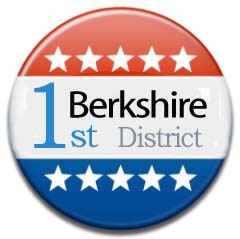 |
ADAMS, Mass. — Edward MacDonald , candidate for state representative in the 1st Berkshire District, released a statement Thursday that explained several key ways to reduce budgets and work collaboratively with other communities:
“My experience as town administrator in Chester can serve as a good example of how a city or town can address its own financial and other problems, within the framework provided by existing state law. When I started in Chester in 2009 the town was having severe financial difficulties. An audit determined that the town had an approximate deficit of just under $380,000, the tax rate was still not set six months after most other towns had set their tax rates, the then-town accountant had made errors that concealed other problems, and the financial picture looked bleak.
Our first step was to achieve efficiencies within town government, by trimming hours of operation, reducing utility usage and ensuring all employees were working efficiently and effectively. The selectmen then decided to ask the town if it wished to raise its own taxes through a Proposition 2 ½ override. Chester is not a wealthy town and does not have a strong history of passing overrides, so the voters declined, and we didn’t pursue the option of adopting local lodging or meals taxes because the town has too few of these establishments to make it worthwhile. We then had to make the hard choices on how to further cut the budget. We laid off employees, made other cutbacks, found a less expensive town accountant who could properly perform the accounting functions, and were finally able to cut the budget and eliminate the $380,000 deficit.
Chester, like many other cities and towns in the Bay State, isn’t out of the woods yet. Additional state aid cuts are looming and operating a municipal government is not becoming less expensive. Some items, such as employee health insurance, fuel and utility costs and road maintenance materials continue to increase in cost. In the face of all these challenges, I am committed to helping municipalities thrive.
Working with a neighboring community is not new to Massachusetts, but the strong emphasis on more formal regional arrangements is new. During my time in Chester I have assisted in creating an arrangement with Becket for lower-cost vocational education transportation and I have worked with various regional agencies on infrastructure improvements and regional waste disposal. As a state representative, I will play a key role in facilitating such arrangements between and among the cities and towns in the 1st Berkshire District. We can do this without giving up our local community identities, a source of pride for most of our citizens. And by doing so, we turn our tax dollars into smart dollars, stretching our limited resources in sensible ways that maximize their spending power, without putting an undue burden on our property taxpayers.
The other important step in helping cities and towns is the Municipal Relief Act. Passed by both the state House and Senate and subject only to a joint conference committee and final approval by the legislature and governor, the new law will allow cities and towns to cut costs by capping municipal pensions at $125,000 per year, offering early retirement incentives and tax amnesty programs and using email for tax billing. It would also allow school districts to share school superintendents and cities and towns to create joint tax assessing agreements. Other provisions would extend local pension funding schedules, increase the threshold at which cities and towns must require bonds by private contractors working for the municipalities, and establish many other measures that will provide financial relief to cities and towns.
As your state representative, I will work with other legislators who want to assist municipalities by helping to pass such additional measures and by reducing expensive burdens imposed by the state through laws and regulations that unnecessarily constrain municipal operations. I would also work to revive the dormant Municipal Incentive Grant Program and the Circuit Rider Program. The MIG program provided small grants to cities and towns to allow them to try innovative solutions to common municipal problems and the Circuit Rider Program provided financial incentives to very small towns to hire professional administrators. Both programs were very successful in the past, but were foolishly eliminated as part of prior state budgets cuts. These programs cost relatively little for the state, but provided significant boosts to cities and towns.
Cities and towns can only go so far in helping themselves, both in the revenues they can raise and by adopting efficient and effective practices that can save them and the property taxpayer money. After that, it’s up to the state legislature to provide additional tools for success and to eliminate legal barriers to good governance at the local level. If cities and towns are to survive these difficult times, they need all the help they can get, through utilizing best practices to achieve efficiencies, implementing promising recommendations of the regionalization commission, taking advantage of new measures in the Municipal Relief Act and by insisting on additional programs and assistance from a state government that too often treats its municipalities like after-thoughts.
The government that is closest to us must be strong and vibrant and provide the critical services that our families need to thrive, because our communities are where we live, work, and play and educate our children. As your state representative for the 1st Berkshire District, there will be no stronger an advocate for the cities and towns of Massachusetts. I ask for your vote on September 14."
| Tags: MacDonald |
MacDonald: I'll Fight For Education Funding
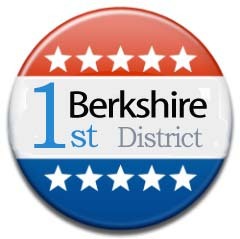 ADAMS, Mass. — Ed MacDonald, candidate for state representative for the 1st Berkshire District, sees education as one of the most important issues that we will have to address in the future.
ADAMS, Mass. — Ed MacDonald, candidate for state representative for the 1st Berkshire District, sees education as one of the most important issues that we will have to address in the future.
"In today's world, we are so completely consumed by the word 'integration,' especially when dealing with the ever-increasing amount of technology in our daily lives. Whether it is cell phones entering all of our pockets, with laptops becoming more commonplace, and wireless Internet providing connectivity for our machines, we are truly becoming more integrated with technology," said MacDonald. "However, this dehumanization of the process by using such an unfeeling word as 'integration' is the first major hurdle we as a people have to acknowledge. Thus, instead of focusing on integration, our focus should be on the process of interweaving science and technology into our daily lives.
"This interweaving process needs to form a continuous fabric that we can further expand upon. Thus, something needs to change in our educational system as the times are changing. Our district and even more importantly, our nation needs to be a leader in this interweaving of technology in order to establish and maintain a true advantage with the rest of the world. As such, a progressive plan has to be established on how to make our district one of the leading powerhouses of the state, the nation, and eventually the world."
The candidate said the Berkshires' prime location allows us to capitalize on talent from all of the very best colleges ranging from one of our closest, Rensselaer Polytechnic Institute, to a bit further but definitive leader in science, Massachusetts Institute of Technology. So far, he said, we have not truly been capitalizing on some of the best and brightest minds of our age. Something needs to change and with change comes great opportunity.
"Our children's educations and their very future will depend on the decisions we make with science and technology," MacDonald continued. "Just as promotion of an interweaving of science and technology is one of the first steps, we have to start from the ground and work our way up.
"The entire puzzle is only complete when we acknowledge that we have a range of students that pass through our education system. With the proper care and attention, we can lead the charge for many generations to come with unparalleled education for our children.
"As your next state representative, I will fight for every dollar that goes into the school system. I will look at changing funding for charter schools versus public schools. Currently, there is no equity in funding public education. Education will be one of my priorities in the State House. We need to remain competitive with the rest of the world and the way to do that is to provide quality education for all."
| Tags: MacDonald |
1st District Candidates Discuss Jobs, Experience
|
Anne Skinner, left, moderated the League of Women Voters debate between the candidates for 1st Berkshire District. |
NORTH ADAMS, Mass. — The three candidates for the 1st Berkshire District fielded questions on jobs, school funding and environmental concerns for an hour on Tuesday night in the muggy confines of the Church Street Center.
David Bissaillon of Adams, Gailanne Cariddi of North Adams and Edward MacDonald of Adams, all Democrats, are seeking to replace outgoing Rep. Daniel E. Bosley in the State House. Each stressed his or her background in government and business and how that would translate into the best representative for the 12-town district in the far northwest corner of the state.
The forum was sponsored by the Williamstown League of Women Voters and moderated by league President Anne Skinner, who posed questions from the league. This was the second time the three candidates have met in a public forum and comes just a month before the Sept. 14 primary that will essentially determine the winner.
The main focus was on jobs, not surprising considering the current economy. Bissaillon, a former president of the Berkshire Chamber of Commerce, said the main thing he'd been hearing over the months has been concerns about employment.
"Business owners want a state government that supports small business, both new and existing, and a government that allows all businesses an opportunity to provide jobs for others," he said, suggesting the Berkshires had to do it the "old-fashioned way" by helping many small businesses grow a little rather than expecting another GE or Sprague to boost the economy. "If we can help 25 companies grow two jobs, that's like creating a mid-sized company."
|
Bissaillon was president of the Chamber of Commerce. |
Bissaillon said he would champion ways to increase energy efficiencies, develop green jobs and other new industries, and collaborations between Berkshire Community College and Massachusetts College of Liberal Arts to prepare a better-educated work force for the needs of the area's more technology-driven companies.
Cariddi, a North Adams city councilor who runs a family business, said she's already been working on such matchups between educational institutions and business as a member of the Berkshire Regional Employment Board. She would work on legislation to support innovation and entrepreneurs and would lobby for seats on committees important to the area.
"I've been saying for months that we need to need to have a seat on the Tourism, Arts and Cultural Development Committee," said Cariddi, so that the Berkshires will have a voice in one of its more important economic drivers. She would also try for the seat on the Natural Resources and Agricultural Committee currently held by outgoing Rep. Denis E. Guyer of Dalton, to ensure Berkshire farmers were represented. "We need to bring our collective wisdom back to Boston."
MacDonald, the town administrator for Chester and a former Adams selectman, said, "Our priorities right now is small industry, [small-business] jobs because that generates 40 percent of the gross revenue in Massachusetts."
|
Cariddi is a longtime city councilor recognized for her environmental advocacy. |
He said he would support a state bank that would back higher-risk loans to help business move forward, incubator programs, and allow small business to spread their losses over three years according to the federal model. MacDonald said representatives have to be more aware of how legislation affects all sectors of the economy, for example the recently passed measure that allows small businesses to team up for better health insurance rates. While good for them, it's being paid for by mid-sized and larger companies.
He pointed to his experience working on legislative issues in both Boston and Albany, N.Y. "I know who's there; I know how to get things done."
In how the area's natural resources play into development, Cariddi, long a supporter of green and environmental initiatives, said "commonsense standards are needed."
MacDonald said town boards working together under the state's permitting laws can aid in development while protecting resources.
"I think there always remains a healthy tension between the economic concerns and development concerns," said Bissaillon. "It wouldn't be the Berkshires if we didn't have those ongoing discussions."
With gaming on the horizon, all three said they would fight for the interests of the county should a casino be built in Palmer. Cariddi said she would prefer it not be a self-contained facility such as in Connecticut but a gaming center that wouldn't compete with local venues.
"I don't think it will be a big moneymaker for the state but I think the community should be allowed to vote because it is going to tremendously impact them," she said, adding surrounding communities should also have a voice.
MacDonald said the expected $300 million to $400 million in revenue would help reduce next year's $1.2 billion deficit in the state budget. "It enhances the state to be competitive; what casino gambling does is give us money for education, to take care of seniors." A third of that money should go to back to the cities and towns, and another third to education, he said.
Bissaillon said he'd heard for years that $500 million to $1 billion in revenue was leaving the state for Connecticut casinos. "Casino gambling is coming to Massachusetts," he said. "What I will do is make sure we protect our interests as much as possible as it relates to the 1st District."
All three also agreed that the state needed to step up its commitment to regional school transportation and, in response to questions from Skinner, said they supported abortion rights and the Transgender Civil Rights bill in the Legislatures. Bissaillon and Cariddi said they were against the death penalty; MacDonald said that while he did not believe it prevented crime, he would support in cases of murder of a public servant or particularly heinous crime.
|
MacDonald has worked in state and local government. |
The candidates expressed their hopes for votes on Sept. 14 and each stated their preparation for the job.
"They need to hear people with real-life experience because small business is the economic driver of our economy," said Cariddi. She noted her 20 years as councilor, and participation on numerous boards and commission. "I have been a responsible and trusted voice for over 20 years and I will be that voice in Boston."
"When necessary, I will get up my Irish dander, that I inherited from my mother and fight like hell for what we need. Fight to make sure those in Boston do not ignore us here in the 1st Berkshire District," said Bissaillon, a vice president of Coakley, Pierpan, Dolan & Collins Insurance Agency with a long history of community volunteerism. "I am the right choice at the right time."
MacDonald, whose loss against Bosley in 1988 for the post spurred him on to college and graduate school, said he had the experience for the Legislature.
"I know how government works because I do it every day. I will be your voice," he said. "And I will work hard every day. No one will work harder than me."
The debate was shown on Northern Berkshire Community Television; it will be repeated later this week and on WilliNet. We'll update with times when we get them.
| Tags: Cariddi, Bissaillon, MacDonald, League of Women Voters |
MacDonald Proposes Changes to Seniors' Tax Exemptions
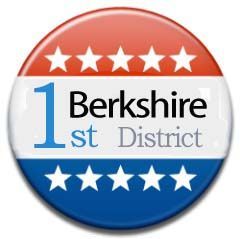 |
ADAMS, Mass. — With increasing costs in everything from health care to real estate taxes, Ed MacDonald, candidate for state representative in the 1st Berkshire District, has proposed increasing the dollar amount granted for qualifying senior citizens' exemptions and adjusting the monetary guidelines they must meet.
Currently, each city and town adopts an elderly exemption for property owners. There are key criteria that need to be met before an exemption is granted. In many communities, these requirements have not changed in years. The basic requirements are that an individual must own and occupy the property on July 1 of the tax year, must live in Massachusetts for the past 10 years, and own and occupy their residence for five years.
In addition to residency requirements, there are income and asset amounts that need to be met. Depending on which clause the city or town voted to accept, the income can range from $6,000 to $15,000. Assets can range from $7,000 to $30,000. These amounts are incredibly low, MacDonald said, and need to be adjusted to meet today’s cost of living standards. Once the income and asset guidelines are increased, MacDonald proposes that the exemption amount be raised from $500 to $1,000 in every community. Currently, each city and town has the authority to pass Clause 41, 41B, or 41C. Each clause has its own set of guidelines.
“I will propose a review of the exemptions that are available to senior citizens. I will recommend that income and asset guidelines increase as well as the exemption amount. Several years ago, the veterans’ exemptions increased but not the elderly exemptions. It’s time we bring the standards up and assist those who want to stay in their own homes,” MacDonald said.
For more information on tax exemptions for seniors, click here.
| Tags: MacDonald, property tax, senior citizens |

